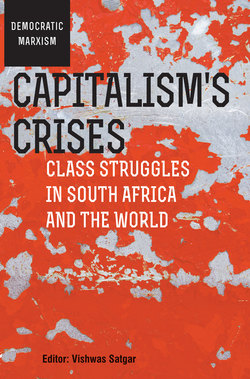Читать книгу Capitalism’s Crises - Alfredo Saad-Filho - Страница 15
На сайте Литреса книга снята с продажи.
MARX’S UNDERSTANDING OF CAPITALIST CRISIS
ОглавлениеMarx has provided social thought with a simple but powerful understanding of capitalism: it is a system that is prone to crisis and this crisis is internal to capitalism. However, Marx did not develop a systematic or adequate theory of capitalist crisis. His work contains ideas and concepts that suggest the existence of this crisis tendency. In the Preface to A Contribution to the Critique of Political Economy, Marx ([1859] 1999: 21) writes:
At a certain stage of development, the material productive forces of society come into conflict with the existing relations of production or – this merely expresses the same thing in legal terms – with the property relations within the framework of which they have operated hitherto. From forms of development of the productive forces these relations turn into their fetters.
This conception of crisis suggests a technological determinism as the basis of crisis and social change within the capitalist mode of production. The contradiction between forces/relations is also a historical contradiction that leads to the breakdown and then supersession of a mode of production. Yet what constitutes the forces of production is not a conceptually clear issue in Marxism, with some Marxists including, over and above the means of production and labour, science and geography into its definition. At the same time, where does this leave class struggle, particularly if, in the logic of accumulation, the forces of production have primacy? The blind veneration of technology and science associated with this perspective also has implications for the socialist alternative. For Stalin, it meant forced-march modernisation and building gigantic factories as the new basis for socialist relations of production. Yet this did not work and instead produced a tyrannical society. This conception of crisis, and ultimately social change, is a very contentious issue in Marxist thought.
In Capital, Marx abstracts to a very high level of generality the dynamics and tendencies that drive capitalism and its mode of production. Generally, the time taken to valorise money into capital, or M–C–M (money–commodity–money), is a simple, and the basic, idea of crisis in Capital. In other words, the failure to valorise money into capital produces crisis. In the three volumes of Capital there are three more important ideas that point to crisis tendencies in capitalism. This is Marx thinking at an abstract level about the deep structures of capital.
First, there is the notion of disproportionality. This relates to an allocation of resources between department one (means of production) and department two (means of consumption) within the scheme for simple and expanded reproduction. Essentially, given the anarchy of capitalist production, individual capitalists will tend to overinvest in a particular department. Allocation will not happen smoothly or rationally. The excess allocation of investment will lead to excess output, which cannot be sold, and the rate of profit will then decline relative to the narrow market. Furthermore, contraction in the overinvested department will not be matched by an adjustment in the underinvested department. This leads to aggregate demand falling, then to a realisation problem and then to a general crisis that ensues in both departments.
Second, underconsumption refers to a decline in aggregate demand, which ensues when capitalists cannot sell all they produce. Underconsumption points to a gap between supply, and what workers can purchase and consume. With workers not having a large enough proportion of the surplus, or with insufficient incomes, aggregate demand declines. Commodities are not sold and this creates a general crisis.
Third, overproduction refers to high levels of productivity or relative surplus value being produced as part of the generation of surplus output. This output or supply exceeds demand and cannot be sold, thus creating a general crisis.
Despite his recognising these tendencies towards crisis in capitalism, and as expressions of deeper contradictions, Marx did not bring these concepts together into a systematic theory of crisis.1 Therefore, Marx’s rich, complex, inchoate – and, in some instances, contradictory – approach to capitalist crisis laid the basis for further development of crisis theories. This task was left to subsequent generations of Marxists and it is a challenge we still face today. But guiding us in this endeavour is how Marx thought about and approached the study of capitalism (Ollman 2003). Marx abstracted, to different levels, to understand how social change happened in the context of capitalist society and this is presented in different ways, which enabled an appreciation of what is old/new, tendential/non-tendential, contradictory/non-contradictory and essential/non-essential.
This varied approach to understanding change applies to Marx’s understanding of crisis. Without an appreciation of the dialectical method in Marx’s thought, his discussion of crisis tendency, which is highly abstracted from capitalist reality and generalised, can easily be confused with an empirical trend. On the other hand, if crisis tendency is not situated within Marx’s method, it can be reduced to mono-causal economic determinism, understood in static terms, without the reader’s appreciating its interconnections with larger processes and the necessary conditions that bring it into being. Finally, Marx’s approach and method prompts a rigorous and studied approach to capitalist reality. This means that although capitalism is inherently prone to periodic crises, these have to be studied at every moment to understand the historical specificity of each crisis and its connections to larger patterns. This also means that Marxism as a body of knowledge is unfinished.
